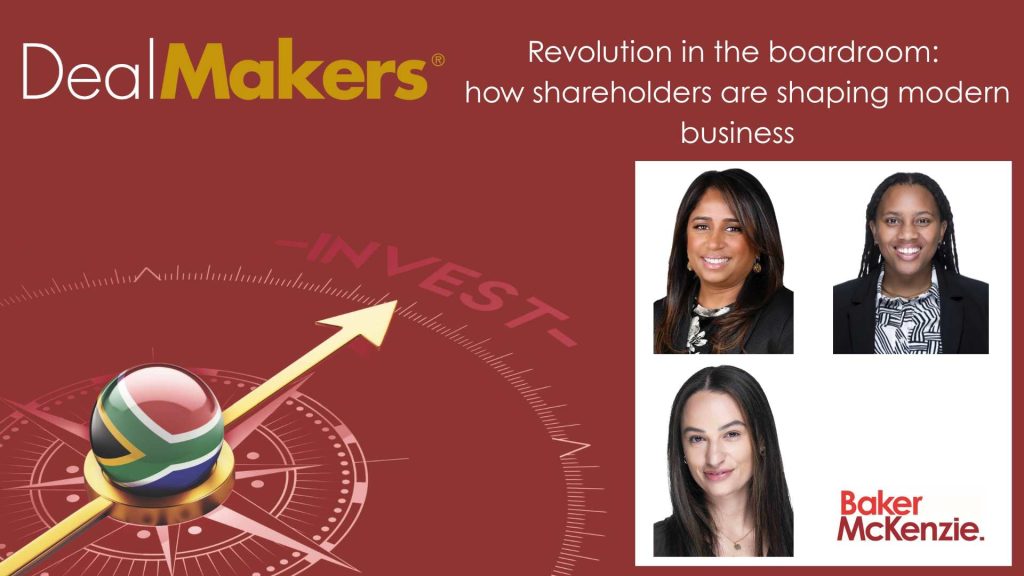Boardrooms are no longer insulated sanctuaries where a handful of executives set the course for an entire company. In South Africa and around the globe, shareholders are stepping out of the shadows and demanding a voice – not only in financial outcomes, but in matters of ethics, transparency and governance. The proposed R23bn Barloworld Limited (Barloworld) buy-out has brought this tension into sharp focus. Despite a premium offer and professional guidance, shareholders flexed their power, sending a clear message: trust and good governance cannot be bought. In an era where investors are becoming activists, boards must recognise that meaningful engagement is non-negotiable. The Barloworld saga is not an anomaly, but a warning shot for any boardroom that underestimates the collective clout of its shareholders.
The Barloworld board sought professional advice on handling the buy-out offer by a consortium led by CEO Dominic Sewela, acting through his family trust, and the Saudi-based Zahid Group, which aimed to acquire all the remaining Barloworld shares (except for excluded shareholders) and delist the company from the JSE.
Management buy-outs like this are not uncommon and, often, it is beneficial to align management and acquirer interests for the future growth of a company. However, shareholder consent for the scheme of arrangement for the Barloworld buy-out was not obtained, with over 60% voting against the proposal. This raises the question: what went wrong?
In order to mitigate the conflict between a director’s fiduciary duty to the company and their personal interest in a management buy-out, section 75 of the Companies Act 71 of 2008 provides rules to ensure that directors always act in the company’s best interests. But leading up to the shareholder vote on the buy-out, media reports highlighted conflict of interest concerns regarding Sewela’s involvement in the buy-out, through his family trust’s interest in the consortium, particularly the timing of his disclosure to the board and the decision to allow him to remain as CEO of Barloworld during the buy-out process.
It is clear from the media reports and the unprecedented media release issued on 28 February 2025 by the Public Investment Corporation (PIC) – a shareholder of about 21.97% of the shares in Barloworld – that the shareholders had been significantly dissatisfied with the board prior to the annual general meeting (AGM) held on 21 February 2025.
This dissatisfaction is evident by the results of the AGM, where the re-election of directors and audit committee members was approved by only 56%-57% of the votes, meaning that just under half of the shareholders (42%-43%) rejected the resolutions.
In its media release, the PIC confirmed that it was one of the shareholders who voted against the re-election of board members at the AGM, expressing concerns about corporate governance standards and the steps the board followed in respect of the buy-out.
All these factors paint a picture of a general lack of trust between the shareholders and the board regarding the management of the business leading up to the buy-out vote. The outcome of the AGM was a clear message of no confidence by the shareholders to the board.
The consortium’s offer to the shareholders was made at a premium to the fair value of Barloworld, i.e. an 87% premium, and within the range recommended by the independent valuer, Rothschild. But interestingly, in this case, the gold did not trump.
The truth is that no matter how much professional advice is sought for a buy-out, and regardless of whether the process has been run to the letter of the law, without shareholders’ trust in the board, a company will essentially experience an adaptive failure in its operations. In today’s world, shareholders are looking for more than just monetary compensation from their investments. They have power, and intend to use it to demand transparency, address conflicts of interest, and hold management to account. This is exactly what 63% of Barloworld’s shareholders did. They said no to a R23bn deal.
The ability to exert influence on the strategy and governance of a board and challenge management decisions is termed shareholder activism. This movement is particularly potent in instances of misalignment between the management team and the shareholders.
Shareholder activism is not a new concept in South Africa, but local companies are still coming to terms with its growing influence and the full impact of such activism. Shareholder activism in South Africa started as early as the mid-80s, when General Motors and over 200 public companies were pressured by investors to withdraw from South Africa as a result of the unjust apartheid regime, a move that contributed to its fall. The decision of the General Motors shareholders illustrates how influential shareholder activism can be, especially when collaborative. More recently, minority shareholders at Sasol Limited, holding as little as 5% of the shares, took over the AGM in protest of the company’s climate stance, resulting in the cancellation of the meeting.
Shareholder activism typically arises when issues related to corporate governance, board independence, remuneration, business performance, trust and diversity are at stake. Shareholder activists can be individuals, institutional investors, or non-profit organisations, and they generally champion two main causes: economic issues and governance.
Economic activists focus on enhancing shareholder returns and improving financial performance. Governance activists, on the other hand, are more concerned with the company’s reputation and its societal impact. They seek to enforce changes in corporate governance practices, and drive initiatives related to inclusion, diversity, equity, and environmental, social and governance standards.
Shareholder activists often employ both legal and extra-judicial tactics to pursue their causes. These tactics are robust, dynamic, often public, and sometimes even hostile. South African legislation plays a fundamental role in supporting shareholder activism, as it encourages and promotes accountability and transparency. For instance, some of the legal tactics used by activists are found in the Companies Act. Section 61(3) empowers shareholders holding as little as 10% of the company’s shares to requisition a shareholders’ meeting. Section 65(3) allows any two shareholders to propose a resolution on matters where they are entitled to exercise voting rights. Additionally, following the enactment of certain provisions of the Companies Amendment Bills, section 26 of the Companies Act allows any person to request access to the company’s records, including its memorandum of incorporation, annual financial statements and securities register.
Other South African legislation also supports shareholder activism. The Promotion of Access to Information Act 2 of 2000 allows individuals to access information held by the state and private bodies when required for the exercise or protection of any rights. The Listing Requirements regulate the fair and equal treatment of shareholders, access to information, voting thresholds for certain corporate actions, pre-emptive rights, and related-party transactions. Both the Companies Act and the King IV Report on Corporate Governance for South Africa 2016 advocate for and enable shareholder activism, providing a platform from which activists derive their powers.
Shareholder activism often emerges when shareholders feel ignored or aggrieved by board decisions, especially where transparency and trust are lacking, and social media is now an important tool for activists to mobilise support and shape public opinion. Open communication and transparency are essential for boards to understand and address shareholder concerns. Without this, shareholder action can stall or derail corporate plans.
In the context of the Barloworld buy-out, the decision to pursue the vote on 26 February 2025 was hasty. Through their vote, two large shareholders had expressed dissatisfaction with the board at the AGM, making it suboptimal to hold the buy-out vote just five days later. In fact, when the board was queried by shareholders on the buy-out at the AGM, it was reported that the board responded with “not appropriate”. There were clearly grievances with the board that needed to be addressed with the shareholders prior to the vote. While some may view the rejection of the buy-out as surprising, proper engagement with the shareholders might have led to a different outcome.
With the buy-out offer rejected, the standby offer remains open. It appears that the Barloworld board has now decided to listen and engage with their shareholders, starting with the PIC, which has now committed to backing the standby offer. The latest commitment pushes the total support for the standby offer to 46.93% of Barloworld’s ordinary shares, excluding treasury stock. This figure includes commitments from other shareholders, as well as holdings by the consortium and the Barloworld Foundation.
So, what does it mean to listen and engage with shareholders? In the PIC media release of 28 February 2025, the PIC expressed support for the employment of previously disadvantaged groups in South Africa and emphasised their preference for transactions that are inclusive and broad-based. They highlighted that the benefits of empowerment in any transaction should extend to a wide range of stakeholders. Recognising these concerns, it is understood that the consortium engaged with the PIC and other shareholders to address their issues. This engagement led to the announcement on 23 April 2025 that the consortium had agreed to implement a broad-based black economic empowerment (BEE) transaction as part of the proposed takeover and delisting of Barloworld. This 13.5% BEE deal, which will be rolled out after Barloworld is removed from the JSE and A2X, aims to address the PIC’s broader public interest concerns tied to the R23bn offer.
So, there it is: shareholder activism in all its glory. It is undeniably a powerful and transformative tool. Companies must recognise that in today’s world, shareholders are not just passive investors; they are active and engaged, demanding more than just financial returns. The Barloworld case highlights the significant power that shareholders wield to hold the board accountable, insisting on transparency and meaningful engagement. Let this be a lesson for future corporate transactions – never underestimate the influence of shareholders, especially when backed by legislation that promotes and fosters shareholder activism. In South Africa, shareholder activism resonates deeply due to our historical context, and it will continue to be, in many instances, more rewarding than cash for some shareholders.
Lydia Shadrach-Razzino is a Partner, Carine Pick a Director Designate and Limani Mangoliso a Candidate Attorney in M&A | Baker McKenzie (Johannesburg)

This article first appeared in DealMakers, SA’s quarterly M&A publication.
DealMakers is SA’s M&A publication.
www.dealmakerssouthafrica.com



